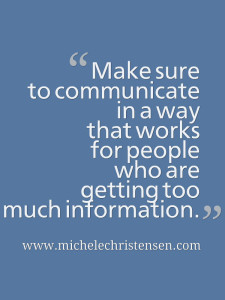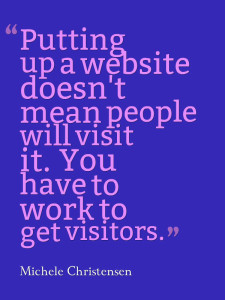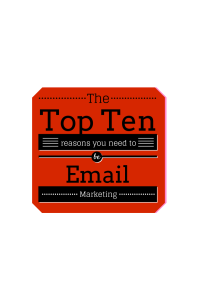 I find myself saying more and more that our brains have become Google-ized. It’s not meant to pick on Google (which I love) but as a shorthand way of saying overloaded, drowning with input and managing more stuff than ever before. I’m increasingly finding that when I’m out just talking to people casually that I have to alter the way I speak because I can’t count on someone’s attention long enough to express a complex thought in 3 sentences. I’m rushing when I talk and trying to compress everything into the smallest number of words possible. While the change has been slow over the past decade, it seems to have really changed a lot in the last 3 to 5 years. One way I’ve changed is that I often shop for a short article on something I want to learn about rather than read a long one because I don’t know if I want to read a long one yet. In other words, I often won’t read a long article on something unless I know beforehand that the subject is worth it to me.
I find myself saying more and more that our brains have become Google-ized. It’s not meant to pick on Google (which I love) but as a shorthand way of saying overloaded, drowning with input and managing more stuff than ever before. I’m increasingly finding that when I’m out just talking to people casually that I have to alter the way I speak because I can’t count on someone’s attention long enough to express a complex thought in 3 sentences. I’m rushing when I talk and trying to compress everything into the smallest number of words possible. While the change has been slow over the past decade, it seems to have really changed a lot in the last 3 to 5 years. One way I’ve changed is that I often shop for a short article on something I want to learn about rather than read a long one because I don’t know if I want to read a long one yet. In other words, I often won’t read a long article on something unless I know beforehand that the subject is worth it to me.

I haven’t seen this as much in business conversations but I think that makes sense. If we’re together to do business or talk about business, it doesn’t make much sense to rush and speak in simple terms. We’ve both committed time and energy to accomplish something, so we put more effort into being effective with our communication.
The important of this is that when people consume your information or content, they may be in a frame of mind where they are looking for a quick read, a fast conclusion, one simple concept or a two-minute breather. You can’t know what your reader’s current frame of mind is when they encounter your content.
As someone who wants other people to read your content, what do you do?
Where possible, consider making your content accessible by as many people as possible regardless of their frame of mind. This doesn’t mean you have to withhold your brilliance, but it does require some adapting. Keep your articles and blog posts on the short side and make them focused on just one point. People can do a quick read, get the point and move on. If you have a more complex concept to present, consider breaking it into individual pieces and linking them. That allows people to get the information a little bit at a time. Tailor your content to the situation – if it’s an article or blog post, you can’t count on much commitment. If it’s a tweet, there’s even less incentive to read it and be focused on it. If it’s a ebook your reader paid for, they probably have a higher level of commitment to the material.
In short, don’t ever dull your brilliance but when possible present it in a way that make it available to as many people as possible no matter what their frame of mind is at the time.

 Just a quick note to let you know that the giveaway event I’m participating in is closing tomorrow. There are 13 great gifts for you to download, and they are all designed around the theme of freedom in your business. Make sure to get the gifts you want before the giveaway closes.
Just a quick note to let you know that the giveaway event I’m participating in is closing tomorrow. There are 13 great gifts for you to download, and they are all designed around the theme of freedom in your business. Make sure to get the gifts you want before the giveaway closes.







